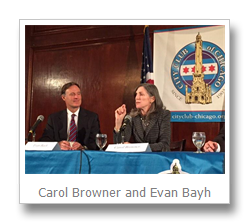Not too long ago Carol Browner would have sided with the activists clad in white hazmat suits protesting nuclear power outside the City Club's lunch Tuesday in downtown Chicago.
Or maybe not so uh-oh:
"I can't believe what I believe about climate change, about the dangers of carbon pollution and take off the table a carbon-free form of power," said Browner...
That’s an evolution that a lot of environmentalists have experienced in the last decade, as shown in the movie Pandora’s Promise. Browner speaks with great authority, as she is the former EPA administrator under President Clinton and director of the White House Office of Energy and Climate Change Policy under President Obama. The Chicago Tribune turns over a lot of the article to anti-nuclear activists, so Browner does not get her full say.
So is there a fuller way to hear Browner’s views on nuclear energy? Happily, local radio station WBEZ interviewed her and, as expected, she is bullish on nuclear but still exceptionally judicious. She pushes for green energy diversity and balances concerns about nuclear safety (and acknowledges that the industry’s record is very good) and proliferation (ditto) against the threat of climate change (dire). The solution presents itself, is in fact inevitable – you can’t solve the emissions puzzle without nuclear energy.
You can listen to the 10 minute interview, which ranges over a number of environmental issues, at Soundcloud. Browner represented the Nuclear Matters campaign in Chicago along with former Sen. (and current Nuclear Matter co-chair) Evan Bayh (D-Ind.) and others in a panel discussion on the future of nuclear energy in Illinois. This is a large topic we’ll address more fully another time. In the meantime, if you want a primer on just how important nuclear energy is to Illinois’ emission reduction goals, this story fills the bill and provides some pointers to more information. You can also pick up some of the conversation at the Chicago panel from Nuclear Matters’ Twitter feed, which is well worth subscribing to.
---
I was surprised to see an anti-nuclear energy screed at The New Republic. The writer, Zoe Loftus-Farren, is a contributing editor at Earth Island Journal, not a very friendly nuclear outlet. Even aside from that, I’d say the articles there are not really to my taste – they’re a bit dreamy, which is at least an interesting approach:
The poet, novelist, essayist and farmer [Wendell Berry] discusses organic foods, his frustrations with the environmental movement, and his love of his horses.
Brower Youth Award Winner Doorae Shin writes that being a progressive activist has fulfilled her childhood fantasy to attend Hogwarts.
Is altruism possible across species borders? And – the crucial question – can an entire species learn to shape its behavior, to its own cost, for the good of other species?
But I like the New Republic. So disappointing.

Comments
The TNR name may exist, but what's left is a zombie at best.
http://youtu.be/octsQF4Y_H0